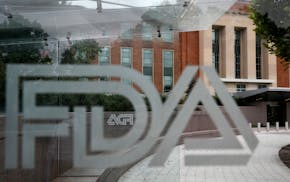A recently reopened ethanol plant in Buffalo Lake, Minn., has again been shuttered and its top executives fired amid a bitter bankruptcy case laced with conflicting allegations of wrongdoing.
"It is a nasty fight," said the company's former chief financial officer, Patrick Riggs, who was terminated in March while on leave for cancer surgery. "It didn't have to be this way."
Only 10 of Purified Renewable Energy's 23 employees remain on the job, mostly to provide security, and the plant has just enough borrowed money for a few weeks, according to court papers and testimony.
The 1997-vintage plant — one of the smallest in the state — resumed production of corn ethanol last year after a farmers cooperative sold it to new investors who obtained financing from the New York hedge fund Platinum Partners LLP. The plant, which had been closed for 2 ½ years, is 75 miles west of the Twin Cities in Renville County and formerly was known as Minnesota Energy.
The revived plant never hit its 25 million-gallon-a-year capacity after two fires last fall disrupted operations. Adding to the woes, a lingering problem with wastewater disposal forced the struggling company to spend money on environmental compliance, court papers say.
Moreover, the entire ethanol industry has struggled in the last year with higher prices for corn, from which the fuel is made.
Three people held the biggest stakes in Purified Renewable Energy — Steven Walker, the CEO; investor James Cushman of Afton, and Riggs, the CFO. Platinum Partners financed the deal through a company called West Ventures. That company says it is owed $18 million.
Earlier this year, West Ventures began taking steps to gain control of the ethanol plant. In an unsuccessful effort to block it, Walker, Riggs and Cushman sued West Ventures and its representative, Jed Latkin, alleging he used threats, intimidation and misrepresentations in a campaign to oust executives and seize control. Latkin declined to comment, but his attorney is asking a Hennepin County judge to dismiss the case.
In March, West Ventures exercised proxies to gain seats on the company's board. Then the company filed a Chapter 11 bankruptcy petition to reorganize. The board also fired Walker and Riggs and brought in a management firm to oversee the plant. Production has ceased.
At the time, Riggs was in a Texas hospital recovering from surgery to remove a tumor on his spine. "I was notified when I woke up … that I was terminated," he later told a judge.
Soon, fresh allegations were flying, this time against the two fired executives. Lawyers for the ethanol company alleged in bankruptcy court that Riggs and Walker had committed "numerous violations of their duties," including paying personal liabilities with company funds.
One serious charge is that Walker deposited a $250,000 insurance check to the company into a separate bank account shortly before his termination. Neither Walker nor his attorneys returned phone calls seeking comment. But in court, Riggs said the CEO made the deposit to safeguard the money from the hedge fund to ensure that employees were paid.
"He didn't want employees missing their payroll checks," Riggs said. As for the other charges, Riggs said in an interview, they are "completely false." Most of the disputed insurance money is still held by a law firm to which Walker had wired the funds.
West Ventures has stepped forward to lend more money to the ethanol plant, in part to pay workers. That arrangement, which was approved by a bankruptcy judge, lasts only until early May. Then the court will decide what happens next.
Riggs said the former executives are trying to arrange financing and retain lawyers to propose a reorganization plan for the company. Bankruptcy Judge Dennis O'Brien, in a recent hearing, wondered about the value of the plant, which has $26 million in liabilities. Attorneys didn't offer an immediate answer.
But Larry Johnson, a veteran ethanol industry consultant who is not connected to the case, said in an interview that working ethanol plants lately have sold for about 50 cents per gallon of annual output. That amounts to only $12.5 million based on the Buffalo Lake plant's capacity. Johnson said some plants have sold recently for even less.
David Shaffer • 612-673-7090 Twitter: @ShafferStrib

Remnants of bird flu virus found in pasteurized milk, FDA says
Timberwolves dispute between Taylor and Lore, Rodriguez over ownership moves to mediation
Tesla 1Q profit falls 55%, but stock jumps as company moves to speed production of cheaper vehicles
Montana minor league baseball team in dispute with National Park Service over arrowhead logo
